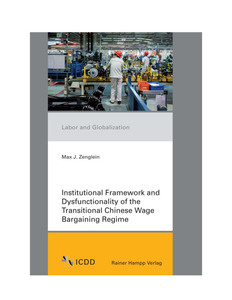| dc.date.accessioned | 2019-01-07T10:47:31Z | |
| dc.date.available | 2019-01-07T10:47:31Z | |
| dc.date.issued | 2018 | |
| dc.identifier | doi:10.17170/kobra-2019010782 | |
| dc.identifier.uri | http://hdl.handle.net/123456789/11021 | |
| dc.description | Die gedruckte Ausg. ist im Rainer Hampp Verlag, Augsburg, München (www.Hampp-Verlag.de) erschienen. | |
| dc.language.iso | eng | |
| dc.publisher | Rainer Hampp Verlag | |
| dc.rights | Urheberrechtlich geschützt | |
| dc.rights.uri | https://rightsstatements.org/page/InC/1.0/ | |
| dc.subject | China | eng |
| dc.subject | industrial relations | eng |
| dc.subject | economic systems | eng |
| dc.subject | institutional economics | eng |
| dc.subject | wage bargaining | eng |
| dc.subject | wage determination | eng |
| dc.subject | emerging economies | eng |
| dc.subject.ddc | 320 | |
| dc.title | Institutional Framework and Dysfunctionality of the Transitional Chinese Wage Bargaining Regime | eng |
| dc.type | Buch | |
| dcterms.abstract | This book examines the institutional building blocks of China’s transitional wage bargaining regime taking into account the macroeconomic and political framework. Special attention is paid to the more volatile institutional setting in emerging economies. The approach enables an evaluation of the how China’s wage determination mechanism is developing. China’s economic reform process launched in 1978 had far reaching consequences on the institutional setting of its economic system. This resulted in substantial re-arrangement of its industrial relations. In an attempt to better understand the changes, this book draws on extensive empirical data, including a case study of wage developments at German companies in China and an analysis of the macroeconomic functionality of Chinese wage bargaining system according to the Keynesian paradigm focusing on inflation, nominal wage growth, productivity as well as the development of consumption demand and wage dispersion. The analysis suggests that the functionality of the Chinese wage bargaining system performs poorly and that the current transitional system lacks a strong institutional structure. Although China’s current wage bargaining system has seen some elements of strengthening its institutional structure, particularly in the area of more coordination, its design remains subordinate to the Communist Party of China’s primary goal of defending an authoritarian one-party rule. Under these conditions China is unlikely to establish a more functional wage bargaining regime. | eng |
| dcterms.accessRights | open access | |
| dcterms.creator | Zenglein, Max J. | |
| dcterms.dateAccepted | 2015-10-29 | |
| dcterms.extent | xiv, 209 Seiten | |
| dcterms.isPartOf | Labor and Globalization ;; Volume 14 | |
| dc.contributor.corporatename | Kassel, Universität Kassel, Fachbereich Gesellschaftswissenschaften | |
| dc.publisher.place | Augsburg, München | |
| dc.relation.isbn | 978-3-86618-899-0 | |
| dc.relation.issn | 2196-5382 | |
| dc.subject.swd | China | ger |
| dc.subject.swd | Arbeitsbeziehungen | ger |
| dc.subject.swd | Institutionenökonomie | ger |
| dc.subject.swd | Lohn | ger |
| dc.subject.swd | Tarifverhandlung | ger |
| dc.type.version | publishedVersion | |
| dcterms.source.series | Labor and Globalization | |
| dcterms.source.volume | Volume 14 | |

